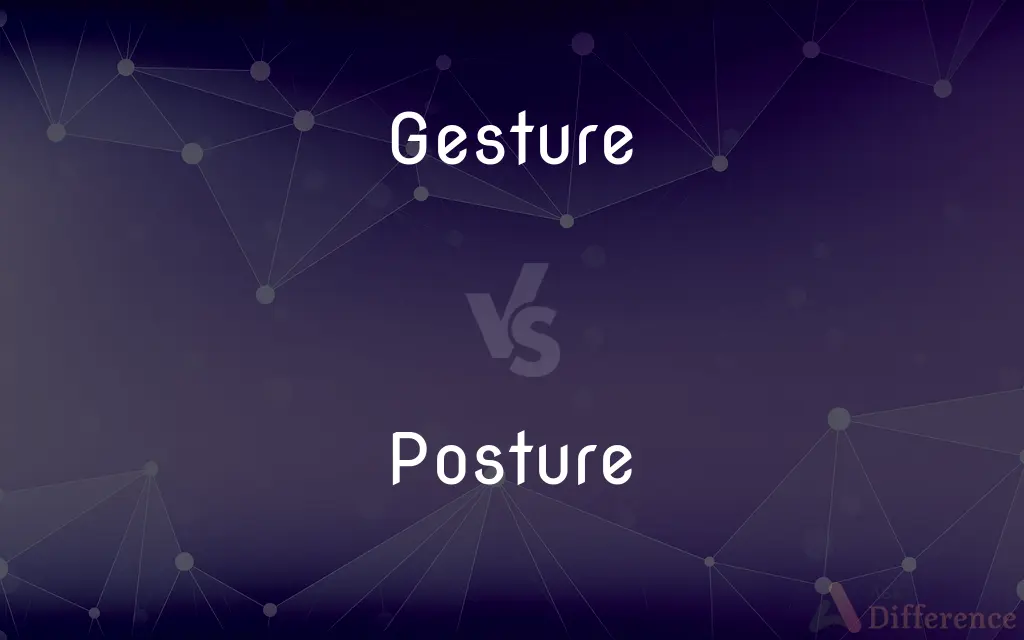Gesture vs. Posture — What's the Difference?
By Tayyaba Rehman & Fiza Rafique — Updated on April 15, 2024
Gesture involves deliberate movements or signals as part of communication, often using hands or body, while posture refers to the way one holds their body when standing or sitting, reflecting attitude or condition.

Difference Between Gesture and Posture
Table of Contents
ADVERTISEMENT
Key Differences
Gestures are movements or positions of the hand, arm, body, face, or other parts specifically used to convey an idea, emotion, or action. They are deliberate and often culturally specific, playing a critical role in non-verbal communication. Conversely, posture is the way in which someone holds their body when standing or sitting. It is generally a sustained position and can indicate a person’s confidence, mood, or health status.
While gestures are transient and vary dramatically across different cultures—such as a nod or a wave—posture is relatively consistent and can be a physical manifestation of a person's well-being or psychological state. Good posture, like standing straight, is often associated with alertness and positive attitude, whereas slouching may be perceived as a sign of fatigue or disinterest.
Gestures can be intentional, like waving goodbye, or involuntary, like shrugging in confusion. They enrich verbal communication and can also stand alone as powerful communicators. Posture, though less dynamic than gestures, is equally telling and can be influenced by physical conditions, emotions, and societal norms.
In communication, effective use of gestures can enhance a speaker’s clarity and engagement level. On the other hand, maintaining a good posture is essential not just for physical health but also for conveying a respectful or professional demeanor.
Gestures can break barriers and facilitate understanding in the absence of spoken language, as seen in sign languages. In contrast, posture can subtly influence social interactions, as it often gives away cues about one's openness, attentiveness, and readiness to engage.
ADVERTISEMENT
Comparison Chart
Definition
Movements or signals by parts of the body to communicate.
The way one holds their body while standing or sitting.
Communication Type
Often deliberate and variable.
Generally consistent and reflective of attitude.
Cultural Variation
High variability; different meanings in different cultures.
Relatively universal, though norms can vary slightly.
Duration
Transient and situational.
Sustained and can change gradually.
Impact
Enhances or replaces verbal communication.
Influences perception of a person’s health, confidence, or mood.
Compare with Definitions
Gesture
A movement of part of the body to express an idea or meaning.
He made a gesture of silence by placing a finger on his lips.
Posture
The position in which someone holds their body when standing or sitting.
She maintained good posture throughout the presentation.
Gesture
An action performed to convey one's feelings or intentions.
Offering his seat was a kind gesture.
Posture
The habitual way one holds one's body.
Yoga can improve your posture.
Gesture
Nonverbal communication used alongside verbal communication to aid expression.
She gestured excitedly as she told the story.
Posture
Reflective of health or emotional state.
Her slumped posture indicated she was tired.
Gesture
Involuntary responses that communicate emotional states.
His shrug was a gesture of ignorance.
Posture
An attitude or approach reflected physically.
His upright posture reflected his military background.
Gesture
Specific signs used in sign language to represent words.
In American Sign Language, nodding is a gesture for yes.
Posture
A stance taken in response to an environment or situation.
His defensive posture made it clear he was upset.
Gesture
A gesture is a form of non-verbal communication or non-vocal communication in which visible bodily actions communicate particular messages, either in place of, or in conjunction with, speech. Gestures include movement of the hands, face, or other parts of the body.
Posture
A position of a person's body or body parts
A sitting posture.
The posture of a supplicant.
Gesture
A movement of part of the body, especially a hand or the head, to express an idea or meaning
So much is conveyed by gesture
Alex made a gesture of apology
Posture
A characteristic way of bearing one's body; carriage
Stooped posture.
Gesture
Make a gesture
She gestured meaningfully with the pistol
Posture
(Zoology) A position of an animal's body or body parts, especially for the purpose of communication
A dog's submissive posture.
Gesture
A motion of the limbs or body made to express or help express thought or to emphasize speech.
Posture
Relative placement or arrangement
The posture of the buildings on the land.
Gesture
The action of making such a motion or motions
Communicated solely by gesture.
Posture
A condition or state under certain circumstances
The nation's posture in the world economy.
Gesture
An act or a remark made as a formality or as a sign of intention or attitude
Sent flowers as a gesture of sympathy.
Posture
An attitude or way of behaving, especially when adopted to have an effect on others
Assumed a posture of angry defiance.
Gesture
To make gestures.
Posture
An approach or policy with regard to something
Adjusting the government's defense posture.
Gesture
To show, express, or direct by gestures
Gestured her disapproval.
Posture
To assume a certain, often exaggerated body position; pose.
Gesture
A motion of the limbs or body, especially one made to emphasize speech.
The middle-finger gesture is really a nonverbal swear.
This Web browser can be controlled with mouse gestures.
Posture
To assume a certain attitude or behave in a certain way, especially to make an impression or gain an advantage
"They postured as Southern Loyalists to win the support of ex-Confederates" (James M. Smallwood).
Gesture
An act or a remark that serves as a formality or as a sign of attitude.
We took flowers as a gesture of sympathy.
Posture
(Zoology) To assume a certain position of the body or of body parts, often as part of a display.
Gesture
(GUI) A motion made with a pointing device, or on a touchscreen, that is recognised by the system as a command.
Posture
To put into a specific posture; pose
The photographer postured the model.
Gesture
(obsolete) The manner of carrying the body; position of the body or limbs; posture.
Posture
To place in a certain arrangement or condition
An army that was postured for defense.
Gesture
(intransitive) To make a gesture or gestures.
My dad told me never to gesture with my hands when I talk.
Never gesture at someone using your middle finger: it may be perceived as an insult.
Posture
The way a person holds and positions their body.
Gesture
(transitive) To express something by a gesture or gestures.
He gestured his disgust.
Posture
A situation or condition.
Gesture
(transitive) To accompany or illustrate with gesture or action.
Posture
One's attitude or the social or political position one takes towards an issue or another person.
Gesture
Manner of carrying the body; position of the body or limbs; posture.
Accubation, or lying down at meals, was a gesture used by many nations.
Posture
(rare) The position of someone or something relative to another; position; situation.
Gesture
A motion of the body or limbs expressive of sentiment or passion; any action or posture intended to express an idea or a passion, or to enforce or emphasize an argument, assertion, or opinion.
Humble and reverent gestures.
Grace was in all her steps, heaven in her eye,In every gesture dignity and love.
Posture
(intransitive) to put one's body into a posture or series of postures, especially hoping that one will be noticed and admired
If you're finished posturing in front of the mirror, can I use the bathroom now?
Gesture
To accompany or illustrate with gesture or action; to gesticulate.
It is not orderly read, nor gestured as beseemeth.
Posture
(intransitive) to pretend to have an opinion or a conviction
The politicians couldn't really care less about the issue: they're just posturing for the media.
Gesture
To make gestures; to gesticulate.
The players . . . gestured not undecently withal.
Posture
(transitive) To place in a particular position or attitude; to pose.
To posture oneself; to posture a model
Gesture
Motion of hands or body to emphasize or help to express a thought or feeling
Posture
The position of the body; the situation or disposition of the several parts of the body with respect to each other, or for a particular purpose; especially (Fine Arts), the position of a figure with regard to the several principal members by which action is expressed; attitude.
Atalanta, the posture of whose limbs was so lively expressed . . . one would have sworn the very picture had run.
In most strange posturesWe have seen him set himself.
The posture of a poetic figure is a description of his heroes in the performance of such or such an action.
Gesture
The use of movements (especially of the hands) to communicate familiar or prearranged signals
Posture
Place; position; situation.
His [man's] noblest posture and station in this world.
Gesture
Something done as an indication of intention;
A political gesture
A gesture of defiance
Posture
State or condition, whether of external circumstances, or of internal feeling and will; disposition; mood; as, a posture of defense; the posture of affairs.
The several postures of his devout soul.
Gesture
Show, express or direct through movement;
He gestured his desire to leave
Posture
To place in a particular position or attitude; to dispose the parts of, with reference to a particular purpose; as, to posture one's self; to posture a model.
Posture
To assume a particular posture or attitude; to contort the body into artificial attitudes, as an acrobat or contortionist; also, to pose.
Posture
Fig.: To assume a character; as, to posture as a saint.
Posture
Position or arrangement of the body and its limbs;
He assumed an attitude of surrender
Posture
Characteristic way of bearing one's body;
Stood with good posture
Posture
A rationalized mental attitude
Posture
Capability in terms of personnel and materiel that affect the capacity to fight a war;
We faced an army of great strength
Politicians have neglected our military posture
Posture
Behave affectedly or unnaturally in order to impress others;
Don't pay any attention to him--he is always posing to impress his peers!
She postured and made a total fool of herself
Posture
Assume a posture as for artistic purposes;
We don't know the woman who posed for Leonardo so often
Common Curiosities
How do cultural differences impact gestures and posture?
Gestures can have different meanings across cultures, while posture has more universal interpretations but may carry subtle cultural nuances.
Can gestures replace verbal communication?
In some cases, such as sign language, gestures effectively replace verbal communication. In other contexts, they complement or emphasize spoken words.
What is the primary difference between gesture and posture?
Gesture is a specific movement meant to communicate, while posture is about how one holds their body habitually or in a situation.
How can one improve their posture?
Regular exercise, mindfulness about sitting and standing habits, and ergonomically supportive furniture can improve posture.
Can posture communicate as effectively as gesture?
Yes, though less dynamic, posture can powerfully convey attitudes, emotions, and responses.
Are there health implications related to posture?
Yes, maintaining good posture is crucial for avoiding musculoskeletal problems and promoting overall physical health.
What role does posture play in professional settings?
Posture can significantly influence first impressions, demonstrating confidence, professionalism, and openness in professional settings.
Why is posture considered important in social interactions?
Posture can indicate a person’s level of engagement and attitude toward others in social interactions, affecting how they are perceived and approached.
What are common gestures that are universally understood?
Some gestures like smiling, nodding, or shaking hands tend to have universal or near-universal recognition and acceptance.
Is it possible to misinterpret gestures and posture?
Yes, especially gestures can be misinterpreted across different cultural contexts. Posture misinterpretation is less common but possible.
Share Your Discovery

Previous Comparison
Party vs. Treat
Next Comparison
Mullet vs. MohawkAuthor Spotlight
Written by
Tayyaba RehmanTayyaba Rehman is a distinguished writer, currently serving as a primary contributor to askdifference.com. As a researcher in semantics and etymology, Tayyaba's passion for the complexity of languages and their distinctions has found a perfect home on the platform. Tayyaba delves into the intricacies of language, distinguishing between commonly confused words and phrases, thereby providing clarity for readers worldwide.
Co-written by
Fiza RafiqueFiza Rafique is a skilled content writer at AskDifference.com, where she meticulously refines and enhances written pieces. Drawing from her vast editorial expertise, Fiza ensures clarity, accuracy, and precision in every article. Passionate about language, she continually seeks to elevate the quality of content for readers worldwide.
















































